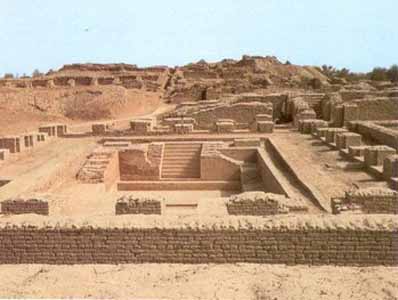
Once upon a time there was a civilization along the Indus River. We know it from the ruins of hundreds of cities found up and down the river and in parts of India and Pakistan. The cities feature neatly laid-out streets, efficient drainage systems, impressive public buildings–obviously a highly-sophisticated civilization. It must have been the home of millions of people, long ago: people who had writing, standardized weights and measures, painting and sculpture, and foreign trade by land and sea.
They must have had rulers, generals, poets, scholars, architects, merchants, priests and gods, and all the rest. But we don’t know the name of even one person who lived in that civilization. Not one.
We can’t read their writing, not one word of it. We don’t know what they called themselves. We don’t know what they named their cities. We know nothing of their gods, or their beliefs. Had archeologists not dug up their cities, we would not know that they had ever been there.
These people were contemporary with civilizations in Egypt, China, and Mesopotamia. Unlike the others, the Indus Valley civilization sank into an oblivion so total that it might as well never have existed at all.
What happened to it?
We don’t know, and probably we’ll never know. But we can speculate.
Ancient Hindu legends seem to hint that Aryan invaders conquered and destroyed the Indus Valley cities. But archeologists have been unable to find any evidence that any of the cities suffered the ravages of war. Nor have they found any evidence of plague, catastrophic drought, etc.
Did God erase them from history because of some sin so monstrous that it could not be recorded?
Did they reach a point in their history when they came to doubt the goodness of their own country, and to despise themselves?
Did their leaders pursue policies so ruinous, so absurd, as to leave their civilization with no witness but its own deserted cities?
Pray we don’t wind up the same.
And while you are thinking of that,remember Nineveh! Nineveh of the high walls? Nineveh of great architexture? Nineveh of ancient times–back in the days of Genesis: “Cush begat Nimrod:…his kingdom was Babel; his son, Asshur, builded Nineveh.
For centuries it was said of her that she never existed! Did she? The historians know but where was she for century upon century? Ask the archaeologists.
And what about the prophets? What did they know about her? Hear the Word of the Lord:
“Now the word of the Lord came unto Jonah the son of Amittai, saying, Arise, go to Nineveh,that great city, and cry against it; for their wickedness is come up before me,”[Jonah 1:1-2]
The burden of Nineveh. The book of the vision of Nahum the Elkoshite, “God is jealous, and the Lord revengeth; the Lord revengeth, and is furious; the Lord will take vengeance on his adversaries, and he reserveth wrath for his enemies,” [Nahum 1:1-2]
Zephaniah, the prophet: “And he will stretch out his hand against the north, and destroy Assyria; and will make Nineveh a desolation, and dry like a wilderness. And flocks shall lie down in the midst of her, all the beasts of the nations: both the cormorant and the bittern shall lodge in the upper lintels of it; their voice shall sing in the windows;desolation shall be in the thresholds; for he shall uncover the cedar work. This is the rejoicing city that dwelt carelessly, that said in her heart, I am, and there is none beside me: how is she become a desolation, a place for beasts to lie down in! every one that passeth by her shall hiss, and wag his hand,” [Zephaniah 2:13-15].
Remember Nineveh!
I can’t add much to that, can I? You and the Bible have said it all.
Interesting post and great reply.
The Flood was c. 2344 BC (1656 years after Creaton) and the Tower of Babel incident happened during Peleg’s lifetime. He was born 101 years after the flood and lived to be 239 years old. So, Babel occurred c. 200 years after the flood. At this time Shem, Ham and Japheth’s descendents were scattered. Japheth’s sons settled Europe and India starting around 2100 BC.
The early great civilizations were founded around this time, according to the biblical timeframe. (Mizraim settled Egypt, etc.) These civilizations were founded by educated individuals with who knows what pre-flood knowledge. This is why these early civilizations appear abruptly and advanced from the start.
Hence, I would suppose then that the lost civilization along the Indus River was founded possibly around 2000 BC if they were indeed contemporaneous to early Egypt, Greece and Babylon.
Ez, I’ve learned not to pay much attention to prehistoric dates. What fascinates me about the Indus Valley Civilization is its total annihilation from history. This is the only genuine civilization I know for which we don’t know the name of a single person who lived in it; for which we don’t even have a single legend, let alone an example of something that really happened; of whose language we don’t know a single word. Even for the Minoans or the Etruscans, we have something. And I wonder if the same fate will overtake the global, humanist civilization we live in today.
Some civilizations die in a bang, others die in a whimper. I suspect that ours is going by the second route, at least for the time being.
Questions and a parable of our country